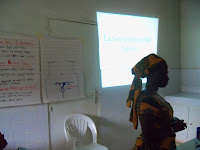In March the maternal and child health training for "Neighborhood Aunts"that we've been trying to get off the ground for months actually happened, and despite some communications difficulties (the cell phone network went down for a week and a half) it went really well. “Neighborhood Aunts” are women who have been selected by their villages to serve as point people for disseminating important health information and encouraging healthy behaviors. Because they live and work in the community they are ideally placed to serve as health resources and can encourage healthy behaviors, such as attending pre-natal visits and seeking early treatment for malaria.
There were also group discussion about why maternal health is important, and the participating women spoke frankly and passionately about how women are often undervalued or seen as replaceable, and how that needs to change. They had the chance to ask all sorts of questions, talk about the reasons that people in their communities wait until the last minute to seek medical care, to discuss why some people are opposed to family planning, and to reaffirm the importance of having "Neighborhood Aunts" in a village.
The Community Center where the training was held is also where local youth can take vocational courses for trades like tailoring and catering, so the lunch and coffee break prep for our training also served as a practicum for a group of catering students. It was really fun to hang out during lunch and coffee breaks, both because the people serving the food were intent on showing off their skills and because all of the women were so obviously delighted at being served a fancy lunch that they didn't have to make from scratch themselves. I think it made them feel important, which made the training feel more important, too.
Once the chairs were rented, the radio announcements made, and the lunches all paid for, my main role was just to sit in the back of the room, taking pictures, occasionally holding fussy babies, and nodding approvingly whenever anyone looked over at me. About half the participants came from other villages, took three whole days out their lives, to attend the training, and it was great to see most of them really enjoying the training, asking good questions and taking their role very seriously. Best of all, the midwives were really pleased, and after the training wrapped up they talked and talked about how to best implicate the newly-qualified "Neighborhood Aunts" in their attended birth and pre-natal visit promotion activities.
For the most part, the midwives would lead a discussion or lecture, and then the women would break into small groups to practice leading health talks and having conversations about a given topic. Then, one by one, they would practice leading a health talk with the whole group, and the midwives would add or correct things as needed. The training was based on the "Neighborhood Aunt" curriculum laid out by the Senegalese Ministry of Health, and the schedule went like this:
Day One
·
Orientation and
discussion of roles
·
The importance of
advocating for ante-natal care
·
Pre-natal visits,
attended births, post-natal visits, and miscarriage
·
Family planning
and reproductive health
Day Two
·
The importance of advocating for child health (0-5 Years)
·
Vaccinations, seeking
early treatment for illness and injuries
·
Community
mobilization methods, implicating community leaders
·
Creating and
managing community health funds
Day Three
·
Planning,
implementation, following up, and reporting activities
·
The importance of
the "Neighborhood Aunt"
·
Evaluation and distribution
of monthly activity reporting forms
·
Review and
closure
There were also group discussion about why maternal health is important, and the participating women spoke frankly and passionately about how women are often undervalued or seen as replaceable, and how that needs to change. They had the chance to ask all sorts of questions, talk about the reasons that people in their communities wait until the last minute to seek medical care, to discuss why some people are opposed to family planning, and to reaffirm the importance of having "Neighborhood Aunts" in a village.
The Community Center where the training was held is also where local youth can take vocational courses for trades like tailoring and catering, so the lunch and coffee break prep for our training also served as a practicum for a group of catering students. It was really fun to hang out during lunch and coffee breaks, both because the people serving the food were intent on showing off their skills and because all of the women were so obviously delighted at being served a fancy lunch that they didn't have to make from scratch themselves. I think it made them feel important, which made the training feel more important, too.
Once the chairs were rented, the radio announcements made, and the lunches all paid for, my main role was just to sit in the back of the room, taking pictures, occasionally holding fussy babies, and nodding approvingly whenever anyone looked over at me. About half the participants came from other villages, took three whole days out their lives, to attend the training, and it was great to see most of them really enjoying the training, asking good questions and taking their role very seriously. Best of all, the midwives were really pleased, and after the training wrapped up they talked and talked about how to best implicate the newly-qualified "Neighborhood Aunts" in their attended birth and pre-natal visit promotion activities.















